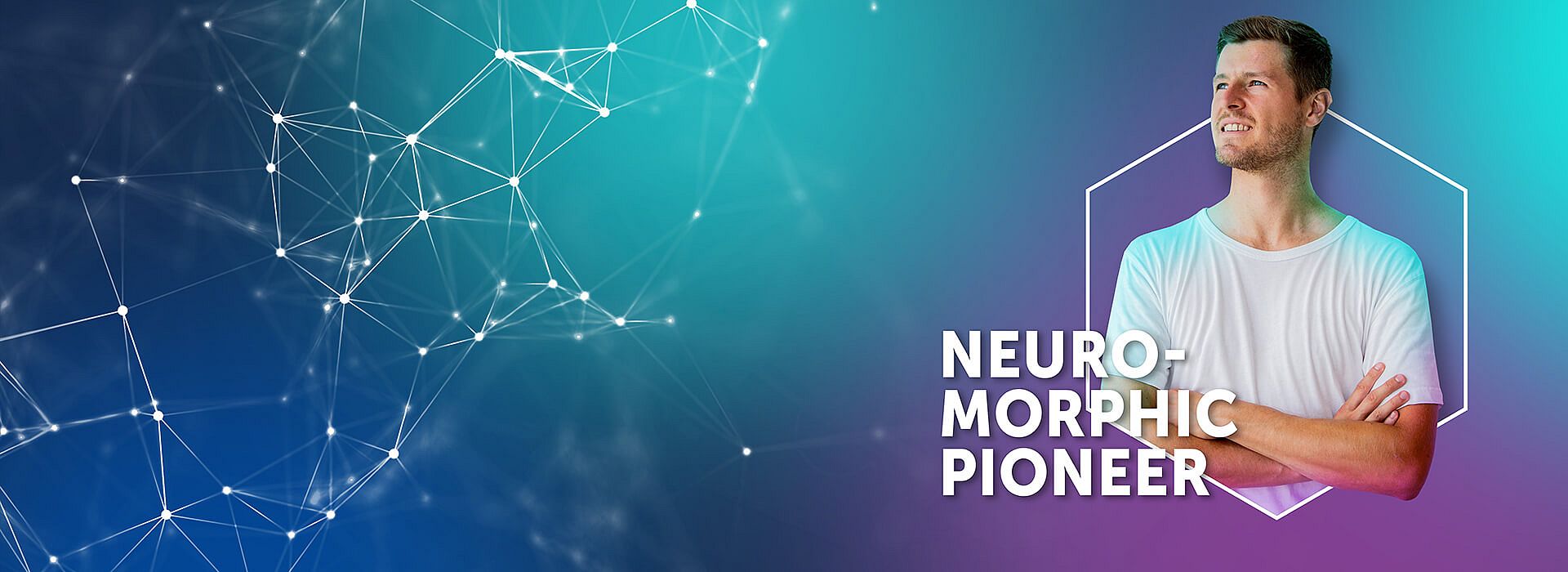
Michael researches energy-efficient AI systems.
As a researcher in the Neuromorphic Computing competence field, I focus on developing prototypes with neuromorphic AI algorithms that are directly inspired by the functioning of the biological nervous system. These algorithms are then implemented on novel neuromorphic hardware to create highly energy-efficient AI systems. A key aspect of my work is to present these prototypes to companies and students to disseminate this future-proof technology approach further.
My research focuses on the development of robust and energy-efficient AI systems based on neuromorphic sensors, algorithms, and hardware. I have succeeded in significantly improving our real-time adaptive gesture recognition demonstrator in the Neuromorphics Labs of our fortiss Labs.
I started programming during my school years and I find it particularly exciting because it allows me to solve specific problems using algorithms. This interest was first sparked in computer science classes in school. During my electrical engineering studies, my interest in software developed further, especially in the way it controls electronic components and thus forms the "brain" of many applications. This enthusiasm led to a deeper understanding of programming and its many areas of application.
I find the working environment at fortiss extremely positive. The good working atmosphere and the international environment make for inspiring collaboration. At the same time, there is also a close connection to local Bavarian companies and institutions, which creates a valuable context. The working environment offers me the optimal space to implement novel ideas flexibly and practically. This promotes the development of creativity and innovative spirit, which in turn leads to significant progress in our research work.
My colleagues are young, dynamic, and come from different countries, which brings international diversity. This dynamism is a solid basis for friendly relationships among colleagues.
In my work, I am driven by the need for more energy-efficient AI solutions, especially in the field of neuromorphic computing. I am very fascinated by the possibility of transferring functionalities from biology to technological applications. This approach enables the creation of powerful AI systems that at the same time act in a resource-saving way. In general, I am driven by the goal of not only understanding modern AI systems but also explaining them to other people in a comprehensible way. As a researcher, I strive to transform complex technologies into understandable concepts and thus make knowledge accessible. This helps to drive the wider acceptance and use of AI.
The biggest challenge for me lies in reconciling technological progress in the field of AI with the challenges of climate change. The pursuit of innovative AI solutions and at the same time the need to adopt environmentally friendly approaches require a balanced approach. What motivates me to continue is the conviction that through our work we can contribute to overcoming these challenges. The opportunity to develop energy-efficient technologies and thus make a positive impact on the global climate spurs me to keep moving forward despite this complex challenge.
My vision is to successfully apply my research results in the following application areas: Firstly, autonomous driving cars based on neuromorphic technologies that safely as well as energy-efficiently guide people through urban traffic. The use of these technologies could increase road safety and at the same time reduce energy consumption, which would have a positive impact on the environment. Secondly, I want to see my results in the field of mobile robots, which can interact with humans in an extremely natural and almost intuitive way thanks to neuromorphic technologies. These robots could help make people's lives easier, whether in healthcare, logistics, or other daily tasks. This vision drives me and gives my research a clear direction, as it offers concrete benefits for society and the environment.
One advantage at fortiss that I would highlight for applicants is the perfect combination of proximity to cutting-edge research at universities and practical application in companies. This unique combination allows employees to benefit from both worlds and to develop innovative solutions that are both scientifically sound and practice-oriented. For applicants who want to apply to fortiss, I would recommend bringing in their own ideas and emphasizing them in the application process. At fortiss, prospective researchers have the opportunity to implement their own ideas and receive direct feedback from both industry and academia. Therefore, I encourage applicants to feel free to apply with their own ideas that fit fortiss' fields of expertise. A tip for applicants at fortiss is to thoroughly inform yourself about the current research projects and focus areas of the institute. This not only shows your interest but also allows you to tailor your application to fortiss' specific strengths and interests.